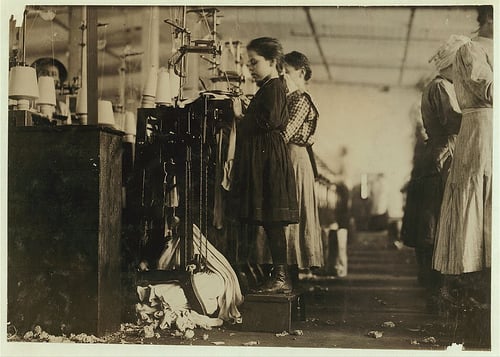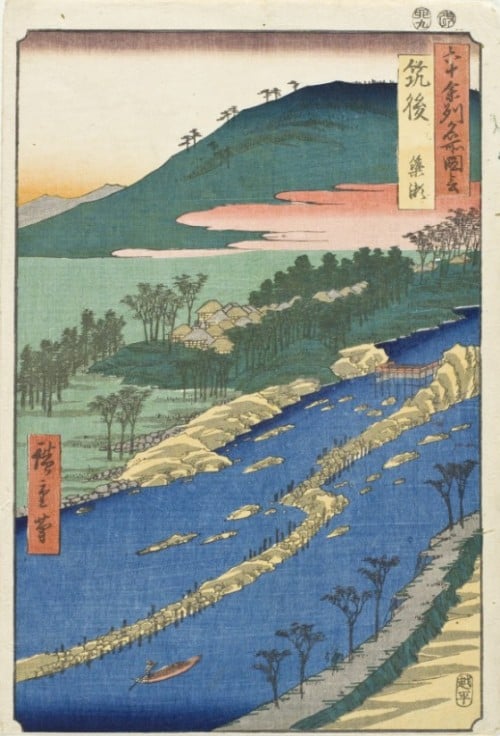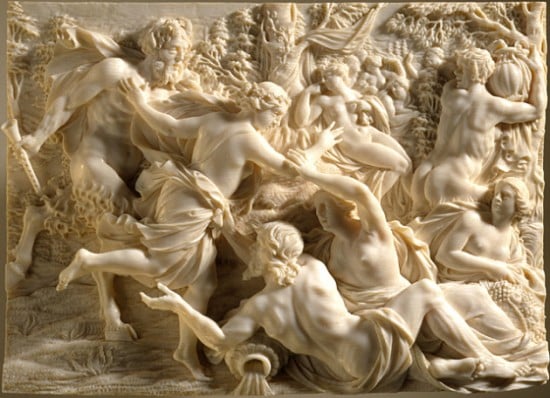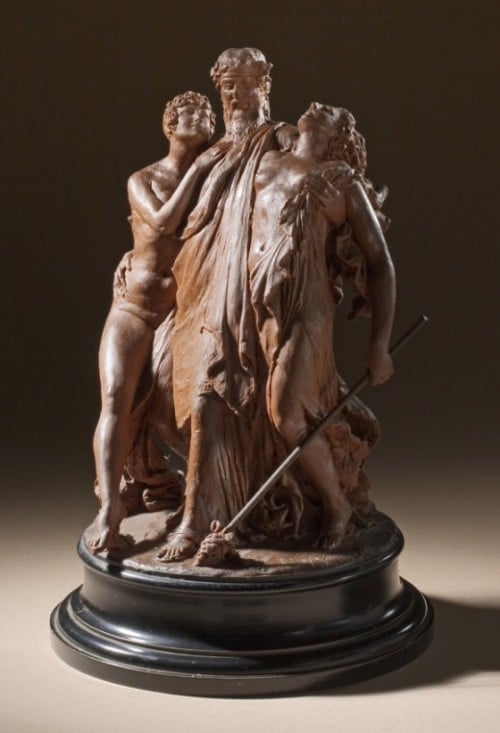Goslings (19)
By:
April 12, 2013
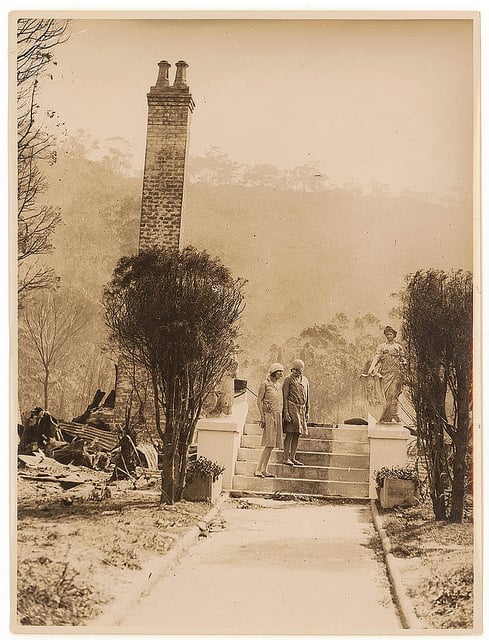
HILOBROW is pleased to present the nineteenth installment of our serialization of J.D. Beresford’s Goslings (also known as A World of Women). New installments will appear each Friday for 23 weeks.
When a plague kills off most of England’s male population, the proper bourgeois Mr. Gosling abandons his family for a life of lechery. His daughters — who have never been permitted to learn self-reliance — in turn escape London for the countryside, where they find meaningful roles in a female-dominated agricultural commune. That is, until the Goslings’ idyll is threatened by their elders’ prejudices about free love!
J.D. Beresford’s friend the poet and novelist Walter de la Mare consulted on Goslings, which was first published in 1913. In May 2013, HiLoBooks will publish a beautiful new edition of the book. “A fantastic commentary upon life,” wrote W.L. George in The Bookman (1914). “Mr. Beresford possesses the rare gift of divination,” wrote The Living Age (1916). “It is piece of the most vivid imaginative realism, as well as a challenge to our vaunted civilization.” “At once a postapocalyptic adventure, a comedy of manners, and a tract on sexual and social equality, Goslings is by turns funny, horrifying, and politically stirring,” says Benjamin Kunkel in a blurb for HiLoBooks. “Most remarkable of all may be that it has not yet been recognized as a classic.”
SUBSCRIBE to HILOBROW’s serialized fiction via RSS.
ALL EXCERPTS: 1 | 2 | 3 | 4 | 5 | 6 | 7 | 8 | 9 | 10 | 11 | 12 | 13 | 14 | 15 | 16 | 17 | 18 | 19 | 20 | 21 | 22 | 23
The two Goslings, working only six or seven hours a day in the mill during the latter part of September, found plenty of time for chatter and speculation. They, and more especially Blanche, had shown themselves capable workers in the harvest field, but when hands had been required in his mill Thrale had chosen the Goslings and those whom he considered less adapted to field work; and among them Mrs Isaacson and a member of the committee, Miss Jenkyn, the schoolmistress. (The education problem was in abeyance for the time being. The children had run wild for three months, and been subject only to the discipline of their mothers, but it was understood that the children were to receive attention when the winter brought opportunity.)
Blanche soon distinguished herself as a picked worker in this sphere. Her intelligence was of a somewhat more masculine quality in some respects than that of the average woman; she was slower, more detailed, more logical in her methods. And now that those male characteristics — so often deplored by women in the days before the plague — had been withdrawn from the flux of life, it had become evident that they had been an essential part of the whole, if only a part. Masculine characteristics were at a premium in Marlow that autumn, and as a natural consequence were being rated at an ever higher value. There was a tendency among some women to become more male….
Millie, however, was not among the progressives. She was not gifted intellectually; she had no swift intuitions — such as Eileen had — which enabled her to comprehend her work; she was naturally indolent, and all her emotions came to her through sensation.
When she was put to work in the mill she was secretly elated. She did not believe the stories told of Jasper Thrale’s insensibility to feminine attractions, and if she believed those other stories which coupled his name with that of Lady Eileen, Millie was of opinion that such an entanglement was not necessarily final.
The first week of her association with Thrale in the work of the mill brought disillusionment.
When she looked up from her work and caught his eye as he passed her, he either stared coldly or stopped and asked in a businesslike, austere voice whether she wanted assistance. Such intimations should have been sufficient, but in this thing, at least, Millie was persistent. She thought that he did not understand — men were proverbially stupid in these matters. So she waited for an opportunity and within ten days one was presented.
A hesitation in some of the machinery she overlooked provided sufficient excuse for calling the head engineer. She looked down the step-ladder which communicated with the floor below and called hesitatingly, “Oh! Please. Mr Thrale.”
He heard her and looked up, “What is it?” he asked.
“Something gone wrong,” she said blushing, “I’ve stopped the rollers, but I don’t know —”
“All right, I’m coming,” he returned, and presently joined her. “By the way,” he remarked as he began to examine the machine, “we don’t say ‘Mister,’ now. I thought you’d learnt that.”
Millie simpered. “It sounds so familiar not to,” she said.
“Rubbish,” grunted Thrale. “You can call me ‘engineer,’ I suppose?”
“Now, look here,” he continued, “do you see this hopper in here?”
She came close to him and peered into the machine.
“It gets clogged, do you see?” said Thrale, “and when the meal stutters you’ve just got to put your hand in and clear it. Understand?”
“I think so,” hesitated Millie. She was leaning against him and her body was trembling with delicious excitement. Almost unconsciously she pressed a little closer.
Thrale suddenly drew back. “Do you understand?” he said harshly.
“Ye–yes, I think so,” returned Millie; and she straightened herself, looked up at him for a moment and then dropped her eyes, blushing.
“Very well,” said Thrale, “and here’s another piece of advice for you. If you want to stay in the mill keep your attention on your work. You’re a man now, for all intents and purposes; you’ve got a man’s work to do, and you must keep your mind on it. If there’s any foolishness you go out into the turnip fields. You won’t have another warning,” he concluded as he turned and left her.
“Beast,” muttered Millie when she was alone. She was shaken with furious anger. “I hate you, you silly stuck up thing,” she whispered fiercely shaking with passion. “Oh, I wish you only knew how I hate you. I won’t touch your beastly machines again. I’d sooner a million times be out in the turnip field than in the same mill with you, you stuck up beast. I won’t work, I won’t do a thing, I’ll —I’ll —”
For a time she was hysterical.
Blanche coming down from the floor above found her sister tearing at her hair.
“Good heavens, Mill, what’s up?” she asked.
Millie had passed through the worst stages of her seizure by then, and she dropped her hands. “I dunno,” she said. “It’s this beastly mill, I suppose.”
“I like it,” returned Blanche.
“Oh, you,” said Millie, full of scorn for Blanche’s frigidity. “You ought to have been a man, you ought.”
“I dunno what’s come to you,” was Blanche’s comment.
It was maturity that had come to Millie. Her new life of air and physical exercise had set the blood running in her veins. In the Wisteria Grove days she had had an anaemic tendency; the limited routine of her existence and all the suppressions of her narrow life had retarded her development. Now she was suddenly ripe. Two months of sun and air had brought superabundant vitality, and the surplus had become the most important factor in her existence. She found no outlet for her new vigour in the work of the mill. Something within her was crying out for joy. She wanted to find expression.
There were many other young women in Marlow that autumn in similar case, and a rumour was current among them that this was a favourable time for crossing the hill. It was said that the lord of Wycombe was seeking new favourites.
Millie heard the rumour and tossed her head superciliously.
“Let him come here. I’d give him a piece of my mind,” she said.
“’E doesn’t come ’ere,” returned the gossip. “’E’s afeard of our Mr Thrale.”
“Oh! Jasper Thrale!” said Millie. “That fellow from Wycombe could knock his head off in no time.”
The gossip was doubtful.
Millie was incapable of formulating a plan in this connexion, but she was seized with a desire for spending the still September evenings in the open air, and always something drew her towards the hill at Handy Cross. That way lay interest and excitement. There was a wonderful fascination in going as far as the top of the descent into Wycombe.
Usually she joined one or two other young women in these excursions. It was understood between them that they went “for fun,” and they would laugh and scream when they reached the dip past the farm, pretend to push each other down the slope, and cry out suddenly: “He’s coming! Run!”
But one afternoon, some ten days after Jasper Thrale had threatened her with the turnip field, Millie went alone.
She had left work early. The rain had not come yet, and Thrale was becoming anxious with regard to the shortage of water. He had the sluices of Marlow and Hedsor weirs closed, and had opened the sluices of the weirs above as far as Hambledon, but so little water was coming down that he decided to work shorter hours for the present.
Blanche had stayed on at the mill to help with repairs. She was rapidly developing into a capable engineer. So Millie, whose only service was that of machine minder, found herself alone and unoccupied.
Every one else seemed to be working. Her friends of the evening excursions were mostly in the fields on the Henley side of the town.
Millie decided she would lie down on the bed and go to sleep for a bit; but even before she came to the cottage she changed her mind. It was a deliciously warm, still afternoon.
Almost automatically she took the road towards Little Marlow; a desire for adventure had overtaken her. Why, she argued, shouldn’t she go into Wycombe? There were plenty of other women there. She would be quite safe. She only wanted to see what the place was like.
Her consciousness of perfect rectitude lasted until she reached the dip beyond Handy Cross. Farther than this she had not ventured before. Some mystery lay beyond the turn of the road.
She sat down in the grass by the wayside and called herself a fool, but she was afraid to go further. She and those friends of hers had made this place the entrance to a terrible and fascinating beyond. She remembered how they had feared to stay there in the failing light, daring each other to remain there alone after sunset. There was nothing to be afraid of, she said to herself; and yet she was afraid.
She was hot with her long climb, and the place was quite deserted. She decided to take down her hair to cool herself.
Curiously, she looked upon this simple act as deliciously daring and in some way wicked. She cast half-fearful glances at the green girt shadows of the descending road, as she shook out the masses of her hair. “If anyone should come!” she thought. “If he should come…!”
She giggled nervously, and shivered.
But as time passed, and no one came, she began to lose her fear, and presently she lay full length on the grass, and stared up into the pale blue dome of the sky until her eyes ached and she had to close them. The deep hush of the still afternoon enveloped her in a great calm.
For a time she slept peacefully, and then she dreamed that she was rushing through the air, and that some one chased her. She wanted desperately to be captured, but it was ordained that she must fly, and she flew incredibly fast. She flew through the sunlight into darkness, and awoke to find that some one was standing between her and the sun.
She lay still, paralysed with terror. She bitterly regretted her coming. She would have given ten years of life to be safe home in Marlow.
“Now, where’ve I seen you before?” asked Sam Evans….
It was nearly dark when Blanche accosted a knot of women in the High Street with a question as to whether they had seen anything of her sister.
One of the women laughed sneeringly. “Ah! She went over the hill this afternoon,” she said. “We were in the fields that side, and saw her go.”
Blanche’s face burned. “She hasn’t! I know she hasn’t!” she blurted out. “She isn’t one of that sort.”
The woman laughed again.
“She’s one of the lucky ones,” another woman remarked. “You can expect her back in a week or two’s time.”
On the same evening that Millie crossed the hill, Lady Eileen Ferrar encountered the spirit of passion in another shape.
The thought of a lonely bathe tempted her, and she crossed the river, made her way through deserted Bisham, and back to the stream along a narrow, overhung lane beyond Bisham Abbey.
The sun had set, but when she came out from the trees there was light in the sky and on the water. Overhead a few wisps of cirrus, sailing in the far heights of air, still caught the direct rays of the sun. Eileen paused on the bank, rejoicing in the glow of colour about her; but as she gazed, the little fleet of salmon-tinted clouds were engulfed in the great earth-shadow, and the delicate crisp rose-leaves were transfigured into flat stipples of steel grey.
A slight chill had come into the air, but the water was deliciously soft and warm. Eileen swam a couple of hundred yards up-stream, towards the gloom of shadows that obscured the course of the river. The after-glow was fading now, and though the surface of the water seemed to catch some reflection of light from an unknown source, the near distance loomed dark and mysterious. She trod water for a few moments, but could not decide whether the river turned to right or left. To all appearances, it terminated abruptly fifty yards ahead….
A new sound was forcing itself upon her attention — a low, steady booming. She stopped swimming, and, keeping herself afloat by slow, silent movements of hands and feet under water, she listened attentively. The dull boom seemed changed into a low, ceaseless moan.
She remembered then the recently opened sluices of Temple Weir, but quite suddenly she was aware of fear. She thought she saw a movement among the reeds by the bank. She thought she heard laughter and the thin pipe of a flute.
Were the old gods coming back to witness the death of man, as they had witnessed his birth? Now that machinery and civilization were being re-absorbed into the nature-spirit from which they had been wrung by the force of man’s devilish and alien intelligence, were the old things returning for one mad revel before the creatures of their sport disappeared for ever, these representatives of a species which had failed to hold its own in the struggle for existence?
Night was coming up like a shadow, and in the east a red, enormous moon was rising, coming not to dissipate, but to enhance the mysteries of the dark, coming to countenance the wild and blind the eyes of man.
Eileen, almost motionless, was floating down with the drift of the sluggish stream. She was afraid to intrude upon the natural sounds of the night, the stealthy trickle of the river, and the furtive rustle of secret movement whose origin she could not guess. And again she thought that she heard the trembling reed of a distant flute.
She touched bottom near her landing-place, and waded out of the river, crouching, afraid even in the black shadow of the trees to exhibit the white column of her slim body. She dried and dressed hastily, and when she felt again the touch of her familiar clothes about her, she knew that she was safe from the wiles of nymph or satyr. She had come out of the half-world that interposes between man and Nature; her clothes made her invisible to the earth-gods, and hid them from her knowledge.
But she was still trembling and afraid. The flesh had terrors great as those of the spirit.
A little uncertain wind was coming out of the south-west, and the trees were stirred now and again into hushed whisperings. A dead leaf brushed her face in falling, and she started back, thrusting at an imaginary enemy with nervously agitated hands.
The thought of her remoteness from life terrified her. She was alone, face to face with implacable, brutal Nature. Man, the boastful, full of foolish pride, was vanishing from the earth. He had been an alien, ever out of place, defiling and corrupting the order of growth. Now he was beaten and a fugitive. All around her, the representative of this vile destructive species, was the slow, persistent hatred of the earth, which longed to be at peace again. There was no god favourable to man, now that he was dying; the gods of man’s creation would perish with him. Only a few women were left to realize that they were strangers in the world of Nature which hated them. The world was not theirs, had never been theirs; they were only some horrible, unnatural fungus that had disfigured the Earth for a time….
She moved cautiously and slowly under the darkness of the trees, and even when she came back to the road she could not shake off her fear. On her right she could see the black cliff of the woods, transfigured by the light of the moon. In the day she knew them for woods; now they were strange and threatening; they menaced her with invasion. She knew that they would march down from the hills and swarm across the valley. In a hundred, two hundred years, Marlow would be a few heaps of brick and stone lost in the heart of the forest.
Ashamed of her race, she hurried on stealthily towards the bridge.
But before she reached it, she heard the sound of a firm, defiant step coming towards her. She paused and listened, and her fear fell from her. In the old days she would have feared man more than Nature, feared robbery or assault, but now, man was united in a common cause; the sound of humanity was the sound of a friend.
“Hullo!” she called, and the voice of Jasper Thrale answered. “Hullo! Who’s that?” he said.
“Me —Eileen,” she replied. “I’ve been for a bathe.”
He paused opposite her, and they looked at one another.
“Jolly night,” he remarked.
“I’ve seen the great god Pan,” said Eileen. “Those sailors in the Ionian Sea were misinformed. He’s not dead.”
“Why should Pan die and Dionysus live?” returned Thrale. “I hear that Dionysus has claimed one of our hands, by the way.”
“Millie?”
“Yes.”
“Are you angry?”
“Yes. Not with Millie. If you saw Pan, why shouldn’t she see Dionysus? No, I’m angry with the Jenkyn woman. She’s saying that we ought not to have Millie back if she wants to come.”
“How silly!” commented Eileen.
“Oh! if that were all!” replied Thrale. “The real trouble is that the Jenkyn woman is proselytizing. She wants to revive Church services and Sunday observances. We’re going to have a split before the winter’s over, and all the old misunderstandings and antagonisms back again.”
“Why, of course we are,” returned Eileen, after a pause. “We are going to divide into those that are afraid and those that aren’t. It’s fear that’s got hold of us, now we’ve time to think. It’s all about us to-night; I’ve seen it, and Millie has seen it; and Clara Jenkyn and all those who are going with her have seen it; and we’ve all got to find our own way out.” She hesitated for a moment, and then said: “And what about you? Have you seen it?”
“Yes, for the first time. Within the last ten minutes,” said Thrale.
The moon was above the trees now, and she could see his face clearly. “Have you?” she asked. “I can’t picture it. It can’t be Pan or Dionysus, or fear of the Earth or of humanity. No; and it can’t be the most terrible of all, the fear of an idea. What are you afraid of?”
“I’m afraid of you,” said Thrale, and he turned away quickly and hurried on in the direction of the river.
“I did see Pan,” affirmed Eileen, as she returned, happy and unafraid, towards Marlow.
RADIUM AGE SCIENCE FICTION: “Radium Age” is HILOBROW’s name for the 1904–33 era, which saw the discovery of radioactivity, the revelation that matter itself is constantly in movement — a fitting metaphor for the first decades of the 20th century, during which old scientific, religious, political, and social certainties were shattered. This era also saw the publication of genre-shattering writing by Edgar Rice Burroughs, Sax Rohmer, E.E. “Doc” Smith, Jack London, Arthur Conan Doyle, Aldous Huxley, Olaf Stapledon, Karel Čapek, H.P. Lovecraft, Charlotte Perkins Gilman, Yevgeny Zamyatin, Philip Gordon Wylie, and other pioneers of post-Verne/Wells, pre-Golden Age “science fiction.” More info here.
HILOBOOKS: The mission of HiLoBooks is to serialize novels on HiLobrow; and also, as of 2012, operating as an imprint of Richard Nash’s Cursor, to reissue Radium Age science fiction in beautiful new print editions. So far, we have published Jack London’s The Scarlet Plague, Rudyard Kipling’s With the Night Mail (and “As Easy as A.B.C.”), Arthur Conan Doyle’s The Poison Belt, H. Rider Haggard’s When the World Shook, Edward Shanks’s The People of the Ruins, William Hope Hodgson’s The Night Land, and J.D. Beresford’s Goslings. Forthcoming: E.V. Odle’s The Clockwork Man, Cicely Hamilton’s Theodore Savage, and Muriel Jaeger’s The Man with Six Senses. For more information, visit the HiLoBooks homepage.
SERIALIZED BY HILOBOOKS: Jack London’s The Scarlet Plague | Rudyard Kipling’s With the Night Mail (and “As Easy as A.B.C.”) | Arthur Conan Doyle’s The Poison Belt | H. Rider Haggard’s When the World Shook | Edward Shanks’ The People of the Ruins | William Hope Hodgson’s The Night Land | J.D. Beresford’s Goslings | E.V. Odle’s The Clockwork Man | Cicely Hamilton’s Theodore Savage | Muriel Jaeger’s The Man With Six Senses | Jack London’s “The Red One” | Philip Francis Nowlan’s Armageddon 2419 A.D. | Homer Eon Flint’s The Devolutionist | W.E.B. DuBois’s “The Comet” | Edgar Rice Burroughs’s The Moon Men | Charlotte Perkins Gilman’s Herland | Sax Rohmer’s “The Zayat Kiss” | Eimar O’Duffy’s King Goshawk and the Birds | Frances Hodgson Burnett’s The Lost Prince | Morley Roberts’s The Fugitives | Helen MacInnes’s The Unconquerable | Geoffrey Household’s Watcher in the Shadows | William Haggard’s The High Wire | Hammond Innes’s Air Bridge | James Branch Cabell’s Jurgen | John Buchan’s “No Man’s Land” | John Russell’s “The Fourth Man” | E.M. Forster’s “The Machine Stops” | John Buchan’s Huntingtower | Arthur Conan Doyle’s When the World Screamed | Victor Bridges’ A Rogue By Compulsion | Jack London’s The Iron Heel | H. De Vere Stacpoole’s The Man Who Lost Himself | P.G. Wodehouse’s Leave It to Psmith | Richard Connell’s “The Most Dangerous Game” | Houdini and Lovecraft’s “Imprisoned with the Pharaohs” | Arthur Conan Doyle’s “The Sussex Vampire.”
ORIGINAL FICTION: HILOBROW has serialized three novels: James Parker’s The Ballad of Cocky The Fox (“a proof-of-concept that serialization can work on the Internet” — The Atlantic); Karinne Keithley Syers’s Linda Linda Linda (which includes original music); and Robert Waldron’s roman à clef The School on the Fens. We also publish original stories and comics. These include: Matthew Battles’s stories “Gita Nova“, “Makes the Man,” “Imago,” “Camera Lucida,” “A Simple Message”, “Children of the Volcano”, “The Gnomon”, “Billable Memories”, “For Provisional Description of Superficial Features”, “The Dogs in the Trees”, “The Sovereignties of Invention”, and “Survivor: The Island of Dr. Moreau”; several of these later appeared in the collection The Sovereignties of Invention | Peggy Nelson’s “Mood Indigo“, “Top Kill Fail“, and “Mercerism” | Annalee Newitz’s “The Great Oxygen Race” | Flourish Klink’s Star Trek fanfic “Conference Comms” | Charlie Mitchell’s “A Fantasy Land” | Charlie Mitchell’s “Sentinels” | Joshua Glenn’s “The Lawless One”, and the mashup story “Zarathustra vs. Swamp Thing” | Adam McGovern and Paolo Leandri’s Idoru Jones comics | John Holbo’s “Sugarplum Squeampunk” | “Another Corporate Death” (1) and “Another Corporate Death” (2) by Mike Fleisch | Kathryn Kuitenbrouwer and Frank Fiorentino’s graphic novel “The Song of Otto” (excerpt) | John Holbo’s graphic novel On Beyond Zarathustra (excerpt) | “Manoj” and “Josh” by Vijay Balakrishnan | “Verge” by Chris Rossi, and his audio novel Low Priority Hero | EPIC WINS: THE ILIAD (1.408-415) by Flourish Klink | EPIC WINS: THE KALEVALA (3.1-278) by James Parker | EPIC WINS: THE ARGONAUTICA (2.815-834) by Joshua Glenn | EPIC WINS: THE MYTH OF THE ELK by Matthew Battles | TROUBLED SUPERHUMAN CONTEST: Charles Pappas, “The Law” | CATASTROPHE CONTEST: Timothy Raymond, “Hem and the Flood” | TELEPATHY CONTEST: Rachel Ellis Adams, “Fatima, Can You Hear Me?” | OIL SPILL CONTEST: A.E. Smith, “Sound Thinking | LITTLE NEMO CAPTION CONTEST: Joe Lyons, “Necronomicon” | SPOOKY-KOOKY CONTEST: Tucker Cummings, “Well Marbled” | INVENT-A-HERO CONTEST: TG Gibbon, “The Firefly” | FANFICTION CONTEST: Lyette Mercier’s “Sex and the Single Superhero”

